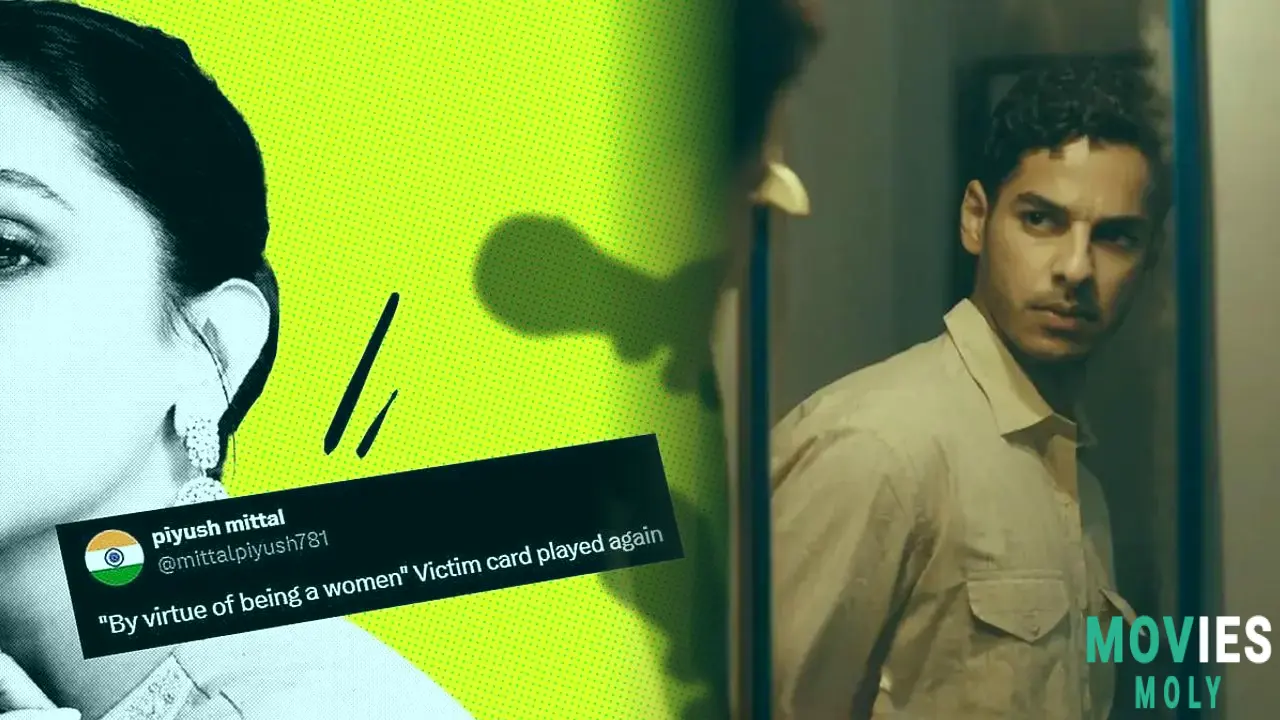Actor Ishaan Khatter is the latest to weigh in on the intense Bollywood conversation about sensible working hours, ignited by Deepika Padukone's bold stance. He agrees that time protocols are often "abused" on sets and calls for greater consideration for everyone's well-being.
TL;DR: Key Takeaways on Bollywood's Work Hour Debate
- Ishaan Khatter has publicly backed Deepika Padukone's advocacy for an 8-hour workday in Bollywood, calling it an "important conversation."
- Deepika's alleged exits from films like 'Spirit' and 'Kalki 2' over her demand sparked the industry-wide discussion, with many stars and filmmakers voicing support for humane working conditions.
- Both actors highlight the frequent "abuse of time protocols" on film sets and emphasize the need for better work-life balance and respect for all crew members.
Bollywood is currently buzzing louder than a premiere night after-party, and it's not about a new romance or a box office record. The talk of the town, in fact, is something far more fundamental: the 8-hour workday. What might seem like a standard in most industries has become a hot topic in the glitzy world of Indian cinema, largely thanks to superstar Deepika Padukone's firm stand.
Now, adding his voice to this critical discussion, actor Ishaan Khatter has stepped forward, admitting that he's witnessed "protocol of time" being "abused" on film sets. This isn't just about actors wanting to go home early; it's a deep dive into the often-grueling reality of filmmaking and the push for a healthier, more sustainable work environment for everyone involved.
Deepika Padukone's Unwavering Advocacy for Standardized Working HoursThe whole conversation really picked up steam with Deepika Padukone's alleged departure from two high-profile projects: Sandeep Reddy Vanga's 'Spirit' (reportedly starring Prabhas) and Nag Ashwin's 'Kalki 2' (a sequel to Prabhas's 'Kalki'). While various rumors floated about creative differences or salary negotiations, the central narrative became her insistence on a fixed 8-hour workday, particularly after becoming a mother.
In an interview with Brut, Deepika didn't mince words, highlighting a clear double standard within the industry.
"In the Indian film industry, there are a lot of male actors who have been working on an 8-hour shift for years, and it has never made headlines. I don't think what I am asking for is ridiculously unfair. I think only someone who has worked in the system enough will know the conditions that we work in. I am saying this as if I may say so…a top star. Imagine what the working conditions must be like for everyone else in the crew."
— Deepika PadukoneHer statement underscores a crucial point: if a "top star" like her feels the need to advocate for this, imagine the unspoken struggles of the vast crew—from lighting technicians to junior artists—who often work tirelessly behind the scenes for far longer hours. She openly stated her advocacy for "a better work-life balance and a better working environment, and better working conditions," asserting that if a project doesn't align with these principles, then "we are not obligated to work with each other." It’s a powerful stance from one of Bollywood’s most prominent female figures.
Ishaan Khatter Voices His Concerns About Time Protocol Abuses

Joining the chorus, Ishaan Khatter shared his perspective in an interview with NDTV, echoing Deepika's sentiments about the often-unregulated hours on set. The 'Homebound' actor revealed, "I've been on sets where sometimes the protocol of time has been abused even, but that is something I would say is an important conversation."
He acknowledged the privileged position actors hold but also urged for broader consideration: "Be considerate about people. It is a privileged position to say that I'm an actor and I can work only as many hours, but they should be considerate of it. Acting is a work of passion. Sometimes we see actors go beyond their shift and see their passion realised." However, he added a critical caveat, implying that this passion shouldn't be consistently taken for granted or exploited. His comments reflect a growing awareness of the human cost of incessant work schedules.
Ishaan further drew a comparison between the work cultures of Bollywood and Hollywood, having experienced both. While praising Bollywood's "jugaadu" (resourceful) and passionate approach, he noted the stark difference in efficiency. "Everything is streamlined [in Hollywood], here things are a little haphazard," he explained. He observed that while Bollywood professionals "will work longer hours than we have to," their Hollywood counterparts "will always switch off." This highlights a fundamental cultural difference, where dedication in Bollywood often equates to endurance, rather than structured efficiency.
Unpacking the Hypocrisy: Why is a Woman's Demand for Work-Life Balance a "Scandal"?

The intensity of the reaction to Deepika’s demand has brought to light a significant gender bias within the industry. As one article pointed out, male actors have historically rejected films, delayed shoots, and made specific demands without facing widespread "unprofessional" labels. Examples like Aamir Khan famously turning down iconic roles (like those in 'Dilwale Dulhania Le Jayenge' or 'Darr') are now "trivia night anecdotes," not scandals. Even Salman Khan's reported late arrivals on sets, causing extensive delays and forcing "daylight" scenes to be shot under artificial lights at night, were noted by director AR Murugadoss as "not easy" but didn't erupt into a "national scandal" questioning his worth or professionalism.
Yet, when Deepika, who has built her legacy from the ground up without a film family background and whose name alone can guarantee box office numbers, asks for reasonable hours, it becomes a fiery debate. Her request to balance professional commitments with personal life after becoming a mother was somehow framed as a "tantrum." This "gendered policing of professionalism" reveals a deep-seated discomfort with women asserting their worth and boundaries in an industry that, despite its glamour, still grapples with issues like comprehensive maternity clauses or mental health protocols.
Even Rani Mukerji, who successfully shot 'Hichki' in shifts after her daughter Adira was born, did so under the aegis of Yash Raj Films, a studio owned by her husband, Aditya Chopra. This unique position likely smoothed any negotiation roadblocks, a privilege not universally shared by other actresses.
Echoes Across the Industry: A Growing Consensus for Change

Deepika and Ishaan aren't alone in their advocacy. Several other prominent personalities from Bollywood have thrown their support behind the push for more humane working hours:
- Vikrant Massey
- Rashmika Mandanna
- Vidya Balan
- Anurag Basu
- Neha Dhupia
- Ajay Devgn (who has long supported the idea of 8-hour workdays for film crews and actors alike)
- Filmmaker Hansal Mehta expressed his concerns on social media, emphasizing that prioritizing well-being leads to better work, efficiency, and profit. He stated, "I truly believe that if we cared about well-being, ours and especially those who hold up the base of this pyramid, we’d not only work better but live better... But first, we need to stop scoffing at the simple idea of rest.”
- Lin Laishram noted that "overworking is never productive" and stressed the importance of regulated work hours, stating, "You become more productive when you have an after-work life too."
These voices indicate a collective realization that the long-standing norm of endless workdays in the film industry is unsustainable and detrimental to both creativity and personal well-being.
Beyond the Glitz: The Human Cost of Excessive Work Schedules

The debate transcends individual actors and taps into a broader societal issue of work-life balance. As psychotherapist and life coach Delnna Rrajesh explains, "For decades, productivity has been conflated with long hours, and burnout has been mistaken for dedication. Yet research and lived experience show us something simple: working longer doesn't mean working better."
Rrajesh points out that the 8-hour shift is not a "favour" but "a globally recognised standard of healthy work-life rhythm." The current culture often labels those who leave on time as "less committed" and those who stay late as "serious contributors," fostering "performative busyness" over actual impact. This leads to hidden emotional costs:
- Chronic Stress: Mental fatigue becomes a constant companion.
- Family Disconnect: Parents miss crucial moments with their children.
- Performance Anxiety: Employees work to "be seen" rather than to create impact.
- Burnout Disguised as Loyalty: Exhaustion dulls creativity and motivation.
The solution, according to Rrajesh, lies in "intelligent structure" and respect for collective time. This includes shorter, sharper meetings; rewarding outcomes, not hours; flexible but firm boundaries; and fostering psychological safety where people can leave without guilt. Breaking the pattern where "staying back late shouldn't be a badge of honour" ultimately benefits everyone.
A Look Back: The Hard-Won Legacy of the Eight-Hour Day
It's important to remember that the eight-hour workday wasn't always a given; it was a hard-fought labor right. Industrial workers in the 19th century endured immense struggles, risking their lives during strikes, to establish the principle of dividing the day into "eight hours for work, eight hours for rest, and eight hours for what you will." This historical context reminds us that this isn't a modern luxury but a fundamental standard for human dignity and well-being.
Ironically, the creative industries, including film, often operate outside these norms. The "chaos of film production is romanticised as artistic passion," where "exhaustion is a badge of honour, and burnouts are rebranded as dedication." This system, often running on personal equations and hierarchies, can blur the lines between glamour and exploitation, making the fight for basic labor rights even more challenging.
Ishaan Khatter's "Homebound" Success and International Exposure Fueling His PerspectiveThe timing of Ishaan Khatter's comments is particularly significant given his recent professional achievements. His latest film, 'Homebound,' directed by Neeraj Ghaywan and co-starring Vishal Jethwa and Janhvi Kapoor, has garnered critical acclaim and has been selected as India's official entry for the Oscars 2026. This success brings him to the forefront of industry conversations.
Furthermore, Ishaan's experience working on international projects, such as 'The Perfect Couple' alongside Hollywood icon Nicole Kidman, has likely broadened his perspective on varying work cultures. He shared his admiration for Kidman's sincerity, comparing it to "some of my young co-actors," and expressed hope that he retains such dedication and "free spirit" in his own career. This exposure to different production environments undoubtedly informs his view on the need for structure and consideration in Bollywood.
The Path Forward: Towards a More Sustainable BollywoodThe ongoing debate ignited by Deepika Padukone and now amplified by voices like Ishaan Khatter's is more than just celebrity chatter. It's a crucial inflection point for Bollywood, pushing it towards introspection and potentially, significant structural change. The industry, known for its vibrant energy and passionate commitment, must find a way to honor that passion without sacrificing the well-being of its workforce.
Moving towards a system that values efficiency, respect for boundaries, and a healthy work-life balance is not merely a "tantrum" or an unreasonable demand. It's a necessary evolution that promises not only a more ethical environment but also, ultimately, a more creative and sustainable future for Indian cinema.
Frequently Asked Questions About the 8-Hour Workday DebateWhy is the 8-hour workday such a big deal in Bollywood right now?
The debate escalated after reports emerged that superstar Deepika Padukone allegedly exited major film projects like 'Spirit' and 'Kalki 2' due to her insistence on a fixed 8-hour workday, sparking a wider discussion across the industry about demanding work schedules and work-life balance.
What is Ishaan Khatter's stance on this issue?
Ishaan Khatter has publicly supported the discussion, stating that he has witnessed "protocol of time" being "abused" on sets. He believes it's an "important conversation" and advocates for greater consideration for all crew members, suggesting that passion for work shouldn't be exploited through excessively long hours.
Have other Bollywood celebrities also commented on this debate?
Yes, many industry figures, including Vikrant Massey, Rashmika Mandanna, Vidya Balan, Anurag Basu, Hansal Mehta, Neha Dhupia, Ajay Devgn, and Lin Laishram, have voiced their support for more humane working conditions and better work-life balance in Bollywood.
Is this merely about actors wanting shorter hours, or is there a deeper issue?
While initiated by actors, the debate highlights a deeper systemic issue within Bollywood's work culture, affecting everyone from crew members to junior artists. Experts emphasize that longer hours don't necessarily equate to higher productivity and often lead to chronic stress, burnout, and a poor work-life balance, ultimately impacting the entire industry's health and creativity.
Sources:
- 'Protocol of time has been abused': Ishaan Khatter REACTS to Deepika Padukone’s eight-hour work shift debate - TOI Entertainment Desk / etimes.in (Oct 19, 2025)
- Deepika Padukone acknowledges 8-hour shift demand, advocates for better work-life balance: ‘I am saying this as…a top star.’; psychotherapist weighs in - Lifestyle Desk (Oct 16, 2025)
- Deepika Padukone and the Price Women Pay for Asking for More - Debiparna Chakraborty (Published: 16 Oct 2025)
- B-town needs correction course, says Ishaan Khatter - News Arena Network (UPDATED: October 19, 2025)
- Eight hours or eternity? Ishaan Khatter joins Deepika in exposing Bollywood’s work culture - Statesman News Service (October 19, 2025)
- Ishaan Khatter supports Deepika Padukone’s 8-hour workday demand; says, 'Protocol of time has been abused' - Entertainment desk (October 19, 2025)






